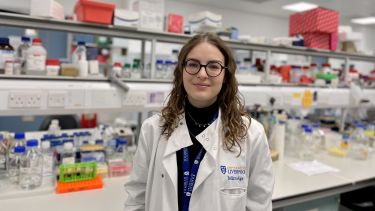The work we did for our research projects was real science

Is there a reason you chose to study neuroscience at Sheffield?
“I did my undergraduate degree in Psychology at Coventry University. I’ve always been interested in brain studies and the more scientific parts of clinical psychology, and I knew I wanted to do a masters with an emphasis on research and lab experience. Neuroscience seemed like a good fit. I discovered Sheffield had the amazing Sheffield Institute for Translational Neuroscience (SITraN), which is really good at what they do; lots of research gets published in national and international circles.
“I initially enrolled in Clinical Neurology as I had the idea of potentially going into medicine or clinical research, but after a chat with Dr Julie Simpson she pointed me to Translational Neuropathology (now incorporated into Translational Neuroscience) which offered more lab experience. It sounded ideal - I could carry out dissections, but also go into the lab and do research.”
What did you enjoy most about your degree?
“Dissection was the part that excited me the most. We did sessions in the dissection room and completed a whole exam on it, with time beforehand to practise on our own with specimens. I learnt a lot. My Psychology course didn’t touch on any specific parts of human physiology, so learning the terminology and technology was daunting at first but the tutors were really good at starting from the basics.
“I also really enjoyed the lab modules because, again, I’d never done anything like that. I’d never even held a pipette before! The course was really well designed for people like me. Within a few months we went from learning the basics, like understanding how cells work and how to stain and analyse samples, to being part of a research group into neurodegeneration for our research project.
The work we did for our research projects was real science. We didn’t just carry out a ‘little’ project; we were part of a research team making real change. After all our intense studying it was really good to go into a lab and put everything into practice.
Karolina Wikaryjczyk
"My masters project was on ALS (amyotrophic lateral sclerosis), also called motor neurone disease (MND). I was optimising a high throughput drug screen to reduce dipeptide repeats (one of the pathologies of the disease), supervised by Dr Adrian Higginbottom.”
What was the teaching and atmosphere on the course like?
“Because the cohort was quite small, the teaching was really personalised. Dr Julie Simpson and Helen Hickson were both amazing and if we had any issues we could go straight to them.
“I definitely made close friends on the course too, especially when we started the research project. We studied together on weekends or after lab work and did write-ups together. Everyone was really helpful, sharing advice from their own supervisors.
“Sheffield itself had a great atmosphere as well. I moved from Coventry, which is a lot smaller. The campus at Sheffield is kind of off the city centre, but still close by. It felt like there was a real university community; it was a great place to be a student.”
In what ways has the masters course informed your current career path?
“The course definitely equipped me with a lot of skills I didn't have before, and helped me to get the job I’ve got now. I’m a Space Biology Research Technician working on one of the space projects at the University of Liverpool called FLUMIAS-ISS, in partnership with the European Space Agency and funded by the UK Space Agency. We are looking into what role hydrogen peroxide has in the loss of muscle mass in microgravity on the International Space Station and how it relates to the muscle loss in the elderly on earth.
“These mechanisms are fairly similar to neurodegeneration in the brain, it’s just different cells and organs. The techniques I use are all skills I picked up during my degree. Dr Adrian Higginbottom was amazing - all the little details which helped me secure my position I learnt from him. I would never have been able to do this job without the masters in Sheffield.”
What would you say to a student thinking about studying neuroscience at Sheffield?
“Ask a lot of questions. Everyone is super friendly and happy to share their knowledge. I was hesitant at the beginning, especially during basic lectures, as I thought I already needed to know everything. But the course is designed to go from basic to actual meaningful research, so make sure to ask questions. It’s also super important to connect with everyone around you, including researchers in the institute, other students, and lecturers. It’s crucial to build your network of people, which can help you with various work experiences, advice and help both during and after the course.”

Masters study discovery afternoon
See where a Sheffield masters could take you with our on-campus event. Get expert advice, take a campus tour and chat to current students.

